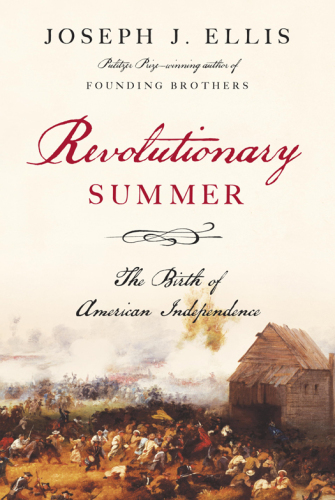
Revolutionary Summer
The Birth of American Independence
کتاب های مرتبط
- اطلاعات
- نقد و بررسی
- دیدگاه کاربران
نقد و بررسی

Starred review from April 8, 2013
If we must have another work on this shop-worn subject, Pulitzer and National Book Award-winner Ellis (for Founding Brothers and American Sphinx, respectively) is the one to write it—his latest is now the definitive book on the revolutionary events of the summer of 1776. Ellis’s prose is characteristically seductive, his insights frequent, his sketches of people and events captivating, and his critical facility always alive, even when he’s praising Washington and faulting British military strategy. Lightly applying what we’ve learned from our own recent wars, Ellis argues that Washington knew what, for example, the North Vietnamese later understood: “His goal was not to win the war but rather to not lose it.” Thanks to Washington’s preservation of the Continental Army, which he accomplished through both sheer luck and brilliant command on Long Island and Manhattan in these critical summer months, the former colonies held on to a chance to win their independence. Another brilliantly told story, carried along on solid interpretive grounds, by one of our best historians of the early nation. 8 pages of color photos & 3 maps. 125,000-copy announced first printing.

Starred review from April 15, 2013
Pulitzer Prize-winning historian Ellis (First Family: Abigail and John Adams, 2010, etc.) writes book after book on the American Revolutionary period. Practice makes perfect. The author's latest alternates between 1776 colonial politics during which the Continental Congress, dominated by John Adams, finally put aside efforts at compromise and opted for independence and the fighting where George Washington's army marched from triumph in the siege of Boston to catastrophe in New York. Ellis delivers few surprises and no cheerleading but much astute commentary. He points out with no small irony that the Continental Congress was at its best in 1776 when thoughtful men debated the benefits of liberty versus the consequences of war with the world's most powerful nation and came to the right decision. Only in the following years, faced with governing the colonies and supplying the army, did it reveal its incompetence. When British forces withdrew from Boston in March, colonial rebels declared a great victory, but Washington worried. Sieges and fighting behind fortifications (i.e., Bunker Hill) were simple compared with standard 18th-century warfare, which required soldiers to maneuver under fire and remain calm amid scenes of horrific carnage. He suspected that his largely untrained militia army would do badly under these circumstances, and events in New York proved him right. Luckily, British Gen. William Howe, despite vastly superior forces, refused to deliver a knockout blow. He would never get another chance. Kevin Phillips' 2012 tour de force, 1775, delivered a massive argument for that year as the key to American independence. A traditionalist, Ellis sticks to 1776 and writes an insightful history of its critical, if often painful, events.
COPYRIGHT(2013) Kirkus Reviews, ALL RIGHTS RESERVED.

April 15, 2013
A specious coherence marks narratives of 1776 in which the Declaration of Independence inevitably occurs while the Continental army's doughty defense of New York ensures that independence would become fact. Events are not, however, so tidily told, avers historian Ellis, who restores contingency to his account of the storied summer and fall of 1776. Identifying a central problem of the historical situation Was there any realistic chance for the British to win? Ellis recounts efforts of moderates within each warring party. On the American side was the rout of anti-independence John Dickinson by the radical John Adams, while Ellis portrays the British side as misunderstanding the colonial rebellion. The commanders George III sent believed in reconciliation with the Americans, and so William Howe conducted the battles of New York cautiously, negotiated futilely with a Ben Franklin serenely sure of American success, and never delivered the decisive blow against George Washington's army. Even had Howe destroyed the Continental army, Ellis suggests that the British still would have confronted strategic failure against an enemy determined to continue the war. With cogent argument and compact prose, Ellis augurs to attract the history audience. HIGH-DEMAND BACKSTORY: Ellis commands a 100,000-plus print run for his latest installment on the American Revolution, tapping his popularity built on such standards as American Sphinx (1997), Founding Brothers (2000), and First Family (2010).(Reprinted with permission of Booklist, copyright 2013, American Library Association.)

January 1, 2013
Even as the 13 Colonies determine to secede, the British send over the biggest armada ever seen. From Pulitzer Prize and National Book Award winner Ellis.
Copyright 2013 Library Journal, LLC Used with permission.

May 1, 2013
From May to October 1776 the Continental Army defended New York City and the surrounding region while the Continental Congress declared American independence and struggled to govern a group of noncohesive, autonomous states. With revolutionary-period expertise and extensive knowledge of the founders, Ellis (lecturer, Commonwealth Honors Coll., Univ. of Massachusetts Amherst; Founding Brothers) contends that American independence was born during this "long summer." He artfully documents the interconnectivity between largely improvised political and military events and discusses the motives and strategies of key players in the context of 18th-century ideologies and circumstances, all of which, he argues, established the framework for the Revolutionary War. He explains Washington's ill-advised, ill-fated decision to defend New York City and environs, and Howe's unreasonable decision not to annihilate the Continental Army, which might have crushed the independence movement. These decisions resulted in a prolonged war that superior British armed forces could not win, and that determined colonials would not lose. Ellis concludes that a decade of British imperial policies, topped with sending an enormous military and naval force to New York, guaranteed British defeat by intensifying American opposition to the expanded authority of Parliament. VERDICT This thought-provoking, well-documented historical narrative is packed with insightful analysis. It will attract general and academic readers.--Margaret Kappanadze, Elmira Coll. Lib., NY
Copyright 2013 Library Journal, LLC Used with permission.

























دیدگاه کاربران